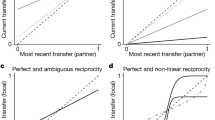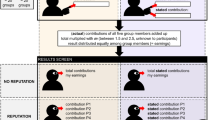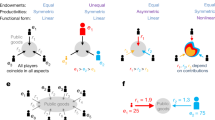Abstract
What makes us willing to sacrifice our own self-interest for another person? Humans can forgo short-term individual gain to achieve long-term benefits1,2,3,4—but long-run self-interest cannot fully explain unselfish behaviour5. Collaboration in our evolutionary past may have played a role in shaping an innate human sense of distributive justice6, influencing who we consider deserving of our aid or generosity. Previous research has not been able to isolate this response to collaboration as an independent effect, distinct from other motivations to share7,8. Here we present evidence of a pure collaboration effect, distinct from motivations of future reciprocity, in-group favouritism or concern for accountability. We demonstrate this effect among adult subjects in an economic setting, showing that the effect constitutes a psychological phenomenon with relevance for real-world social and political behaviour. This collaboration effect is substantial: it motivates sharing among people otherwise inclined to share nothing and increases the proportion of participants willing to give up half of their allotted money. We find evidence supporting our hypothesis that the collaboration effect operates by creating a sense of debt owed to one’s collaborator.
This is a preview of subscription content, access via your institution
Access options
Access Nature and 54 other Nature Portfolio journals
Get Nature+, our best-value online-access subscription
$29.99 / 30 days
cancel any time
Subscribe to this journal
Receive 12 digital issues and online access to articles
$119.00 per year
only $9.92 per issue
Buy this article
- Purchase on Springer Link
- Instant access to full article PDF
Prices may be subject to local taxes which are calculated during checkout




Similar content being viewed by others
Code availability
The code reproducing the analysis is publicly available in Northwestern University’s Arch Research and Data Repository at: https://arch.library.northwestern.edu/collections/mg74qm27m.
Data availability
The data sets generated during and analysed for the current study are publicly available in Northwestern University’s Arch Research and Data Repository at: https://arch.library.northwestern.edu/collections/mg74qm27m. These data sets include data for all figures (Figs. 1–4).
References
Ostrom, E. Governing the Commons (Cambridge Univ. Press, New York, 1990).
Andreoni, J. & Miller, J. H. Rational cooperation in the finitely repeated prisoner’s dilemma: experimental evidence. Econ. J. 103, 570–585 (1993).
Nowak, M. A. & Sigmund, K. Evolution of indirect reciprocity by image scoring. Nature 393, 573–577 (1998).
Nowak, M. A. & Sigmund, K. Evolution of indirect reciprocity. Nature 437, 1291–1298 (2005).
Fehr, E. & Fischbacher, U. The nature of human altruism. Nature 425, 785–791 (2003).
Hamann, K., Warneken, F., Greenberg, J. R. & Tomasello, M. Collaboration encourages equal sharing in children but not in chimpanzees. Nature 476, 328–331 (2011).
Milinski, M., Semmann, D. & Krambeck, H.-J. Reputation helps solve the ‘tragedy of the commons’. Nature 415, 424–426 (2002).
Brewer, M. B. In-group bias in the minimal intergroup situation: a cognitive-motivational analysis. Psychol. Bull. 86, 307–324 (1979).
Konow, J. A positive theory of economic fairness. J. Econ. Behav. Organ. 31, 13–35 (1996).
Alesina, A. & Angeletos, G.-M. Fairness and redistribution. Am. Econ. Rev. 95, 960–980 (2005).
Gilens, M. Racial attitudes and opposition to welfare. J. Polit. 57, 994–1014 (1995).
Shaw, A. & Olson, K. R. Children discard a resource to avoid inequity. J. Exp. Psychol. Gen. 141, 382–395 (2012).
Fehr, E., Fischbacher, U. & Gächter, S. Strong reciprocity, human cooperation, and the enforcement of social norms. Hum. Nat. 13, 1–25 (2002).
Bowles, S. & Gintis, H. The evolution of strong reciprocity: cooperation in heterogeneous populations. Theor. Popul. Biol. 65, 17–28 (2004).
Gintis, H., Henrich, J., Bowles, S., Boyd, R. & Fehr, E. Strong reciprocity and the roots of human morality. Soc. Justice Res. 21, 241–253 (2008).
Fong, C. M., Bowles, S. & Gintis, H. in Handbook of the Economics of Giving, Altruism and Reciprocity Vol. 2 (eds Kolm, S.-C. & Ythier, J. M.) 1439–1464 (Elsevier, London, 2006).
Aristotle. Nicomachean Ethics (Harvard Univ. Press, Cambridge, MA, 1926).
McCall, L. The Undeserving Rich (Cambridge Univ. Press, New York, 2013).
Corbit, J., McAuliffe, K., Callaghan, T. C., Blake, P. R. & Warneken, F. Children’s collaboration induces fairness rather than generosity. Cognition 168, 344–356 (2017).
Locke, J. Two Treatises of Government (1689) (Millar, London, 1764).
Guala, F. Reciprocity: weak or strong? What punishment experiments do (and do not) demonstrate. Behav. Brain Sci. 35, 1–15 (2012).
Axelrod, R. & Hamilton, W. D. The evolution of cooperation. Science 211, 1390–1396 (1981).
Otten, S. & Moskowitz, G. B. Evidence for implicit evaluative in-group bias: affect-biased spontaneous trait inference in a minimal group paradigm. J. Exp. Soc. Psychol. 36, 77–89 (2000).
Dasgupta, N. Implicit ingroup favoritism, outgroup favoritism, and their behavioral manifestations. Soc. Justice Res. 17, 143–169 (2004).
Leyens, J.-P. et al. The emotional side of prejudice: the attribution of secondary emotions to ingroups and outgroups. Personal. Soc. Psychol. Rev. 4, 186–197 (2000).
Chatman, C. M. & von Hippel, W. Attributional mediation of in-group bias. J. Exp. Soc. Psychol. 37, 267–272 (2001).
Brewer, M. B. The psychology of prejudice: ingroup love or outgroup hate? J. Soc. Issues 55, 429–444 (1999).
Hoffman, E., McCabe, K. & Smith, V. L. Social distance and other-regarding behavior in dictator games. Am. Econ. Rev. 86, 653–660 (1996).
Bohnet, I. & Frey, B. S. Social distance and other-regarding behavior in dictator games: comment. Am. Econ. Rev. 89, 335–339 (1999).
Henrich, J. et al. ‘Economic man’ in cross-cultural perspective: behavioral experiments in 15 small-scale societies. Behav. Brain Sci. 28, 795–855 (2005).
Amir, O., Rand, D. G. & Gal, Y. K. Economic games on the internet: the effect of $1 stakes. PLoS One 7, e31461 (2012).
Rand, D. G. et al. Social heuristics shape intuitive cooperation. Nat. Commun. 5, 3677 (2014).
Acknowledgements
Funding for experiment 4 was provided through Northwestern University’s Institute for Policy Research. The funders had no role in study design, data collection and analysis, decision to publish or preparation of the manuscript. We thank G. Huber, J. Druckman, D. Botti, A. Fang and P. Tucker for important feedback.
Author information
Authors and Affiliations
Contributions
M.C.M. conducted experiment 4. M.C.M. and A.S.G. otherwise contributed equally.
Corresponding author
Ethics declarations
Competing interests
The authors declare no competing interests.
Additional information
Publisher’s note: Springer Nature remains neutral with regard to jurisdictional claims in published maps and institutional affiliations.
Supplementary information
Supplementary Information
Supplementary Methods and Supplementary Tables 1 and 2.
Rights and permissions
About this article
Cite this article
McGrath, M.C., Gerber, A.S. Experimental evidence for a pure collaboration effect. Nat Hum Behav 3, 354–360 (2019). https://doi.org/10.1038/s41562-019-0530-9
Received:
Accepted:
Published:
Issue Date:
DOI: https://doi.org/10.1038/s41562-019-0530-9



